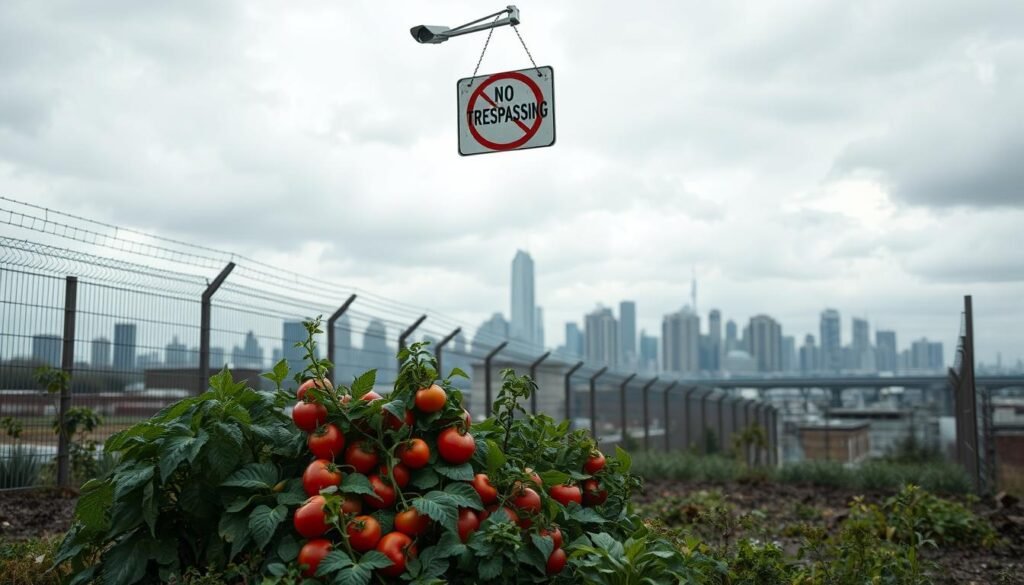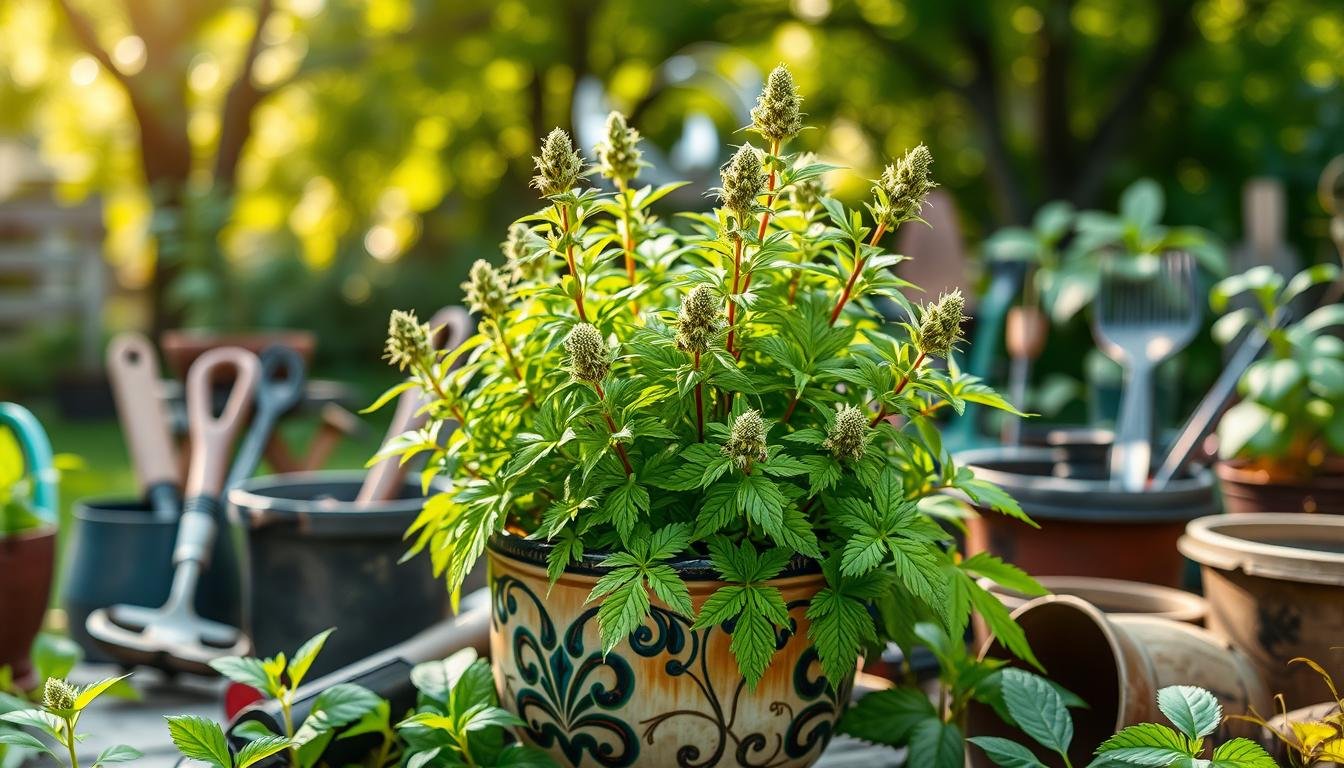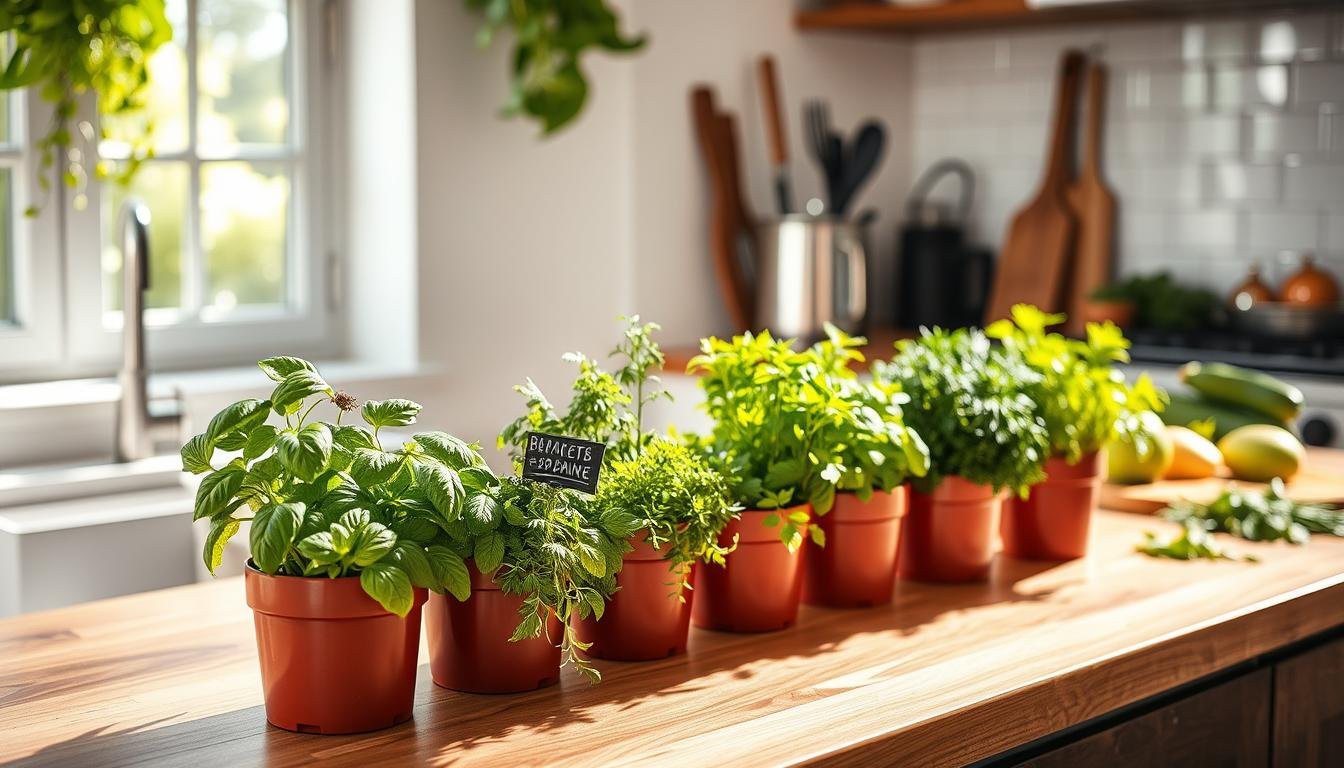About 35% of American households garden at home. Still, many folks wonder if it’s legal. This confusion comes from local rules and city farming laws. Good news though, most people in the U.S. can grow their gardens without legal issues. We’ll explore the reality of growing food at home and walk you through state and city rules.
Key Takeaways
- The majority of American households participate in home gardening.
- Misconceptions about the legality of home food production are common.
- Urban gardening laws vary significantly by state and municipality.
- Understanding local regulations can empower aspiring gardeners.
- This article aims to clarify the myths versus facts regarding growing your own food.
Overview of Home Food Production in the U.S.
Across the United States, more people are growing their own food. This trend is fueled by a desire for healthier living and more sustainable habits. Many Americans are now gardening, turning their backyards into sources of vegetables, fruits, and herbs. This change is not just about being self-sufficient. It also strengthens community bonds through shared gardening activities.
Urban gardens and community projects are popping up everywhere, showing a big shift toward home-grown food. This movement is supported by laws that make it easier for people to grow food at home. Millions of Americans have embraced gardening. They’re driven by the desire for fresher food, lower food bills, and reducing their environmental impact.
Home gardening has long been part of American culture, especially during tough times like the World Wars. Today, this tradition is alive and well as more families grow their own food. Using organic methods is popular. It’s good for health and helps the planet by cutting down on pesticides and increasing biodiversity.
It’s important to understand local laws about growing food at home. These laws differ a lot depending on where you live. They affect what you can grow and how you do it. Knowing these rules can help you set up a successful garden that follows local guidelines.
Understanding Urban Gardening Laws
Urban gardening laws can be quite complex. They often change a lot from one place to another. Local governments set specific rules for gardens to make sure they are safe and will last. These rules can cover the garden size, what plants you can grow, and using pesticides.
In New York, for example, there are rules to help keep green spaces while controlling what plants are okay to grow. These rules might push for using natural ways instead of chemical stuff. In contrast, Los Angeles has its own rules that tell you how you can pick fruits and veggies in your yard. It’s really important for gardeners in the city to know these rules.
Some common rules include:
- The types of plants you’re allowed to have, usually those native to the area.
- How big your garden can be, especially if it’s a community garden.
- Keeping your garden looking nice and clean.
Urban gardeners should really look into their city’s gardening rules before they start their gardens. Being aware of these rules can stop legal problems. It also helps in making community gardens better for everyone.
Growing Your Own Food Illegal: Myths vs. Facts
Many people think it’s illegal to grow your own food. This idea stops would-be gardeners from starting. Knowing the truth is key for those wanting to farm at home.
Common Misconceptions About Home Gardening
Some believe home gardening might get them in trouble. This fear often comes from not understanding the rules. Yet, most places actually support home gardens and see their value.
Some of the wrong ideas are:
- All plants must be regulated, which is generally untrue.
- Growing food can lead to fines or legal actions, which seldom occurs without specific violations.
- Gardening requires special permits in all cases, which is not universally accurate.
These false ideas create unnecessary worry. Gardeners should look into their local laws. This way, they know what’s allowed.
Legal Support for Backyard Farmers
Knowing your rights as a gardener is crucial. Many groups help city gardeners. They clear up rules about gardening at home. They also offer guidance on following local laws.
They may provide:
- Legal aid for gardeners facing disputes.
- Resources for understanding agricultural laws.
- Workshops on sustainable gardening practices.
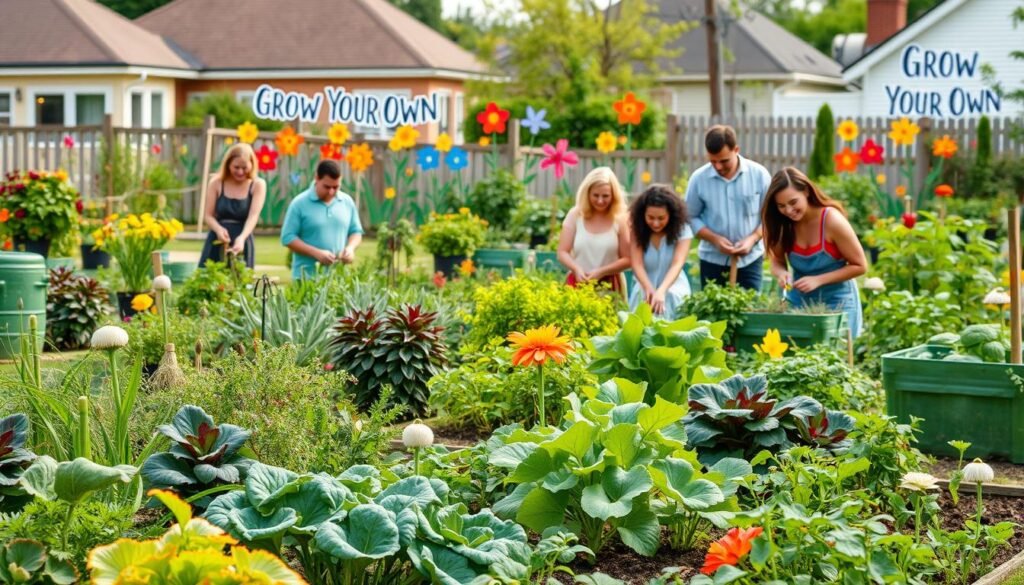
Gardeners can farm at home without fear by knowing their rights. Education is key. It lets gardeners use sustainable methods while sticking to the rules.
Zoning Restrictions for Home Gardens
Zoning restrictions greatly influence what we can do in our backyards. They often set limits on the types and amounts of plants you can have. This means people looking to grow their own veggies might face hurdles. In some places, you might only be allowed to grow flowers, not food.
- Height restrictions for garden structures, like trellises or raised beds
- Limits on the number of animals, such as chickens or bees
- Restrictions on certain types of plants, often based on their invasive nature
Dealing with these rules can be tough for gardeners. It’s smart to get to know the zoning laws in your area. Joining local garden groups or going to town meetings can help. If the rules are too strict, you might be able to ask for changes.
Understanding your local zoning laws is key. It not only makes sure you follow the rules but also lets you help shape gardening policies locally.
| Type of Regulation | Description | Impact on Gardening |
|---|---|---|
| Height Restrictions | Limits the height of plant structures | May hinder vertical gardening options |
| Animal Limits | Restricts the number of livestock | Impacts small-scale farming and egg production |
| Plant Types | Prohibits certain invasive plants | Affects plant diversity and crop yield |
Residential Agriculture Permits: What You Need to Know
Getting the right residential agriculture permits is key for home food growing. Each local area has its own rules, so it’s important to know which permits you need for your garden. We’ll look at different permits you might need and explain how to apply for them.
Types of Permits Required
Starting a home garden means you need to know about different agriculture permits. Here are some you might need:
- Residential farming permits: These are often needed for big gardens or selling your produce.
- Community garden permits: These permits are for when you and your neighbors garden together.
- Special use permits: You’ll need these if local laws have special rules for gardens in your area.
Application Process for Residential Agriculture Permits
The steps for getting a gardening permit depend on where you live and your garden’s size. Here’s what you usually have to do:
- Look up local rules to see which permits you need.
- Collect needed documents, like a plan of your garden and a description of it.
- Fill out the forms carefully to avoid hold-ups.
- Turn in your application to the local government.
- Be ready for inspections or meetings if the local rules require it.
Knowing about residential agriculture permits makes starting your garden easier. Following the rules helps your garden grow and benefits everyone in the community.
| Permit Type | Purpose | Common Requirements |
|---|---|---|
| Residential Farming Permit | For larger-scale gardening. | Site plan, project description, fee. |
| Community Garden Permit | For shared gardening spaces. | Agreement among participants, site approval. |
| Special Use Permit | For unique agricultural uses. | Local zoning compliance, detailed project proposal. |
Municipal Bylaws for Vegetable Gardens
Understanding the bylaws for vegetable gardens in cities is key for anyone wanting to grow food. These rules outline what you can plant, how it should look, and how to take care of it. Cities have their own local gardening laws, impacting gardening projects.
To avoid problems with neighbors and the city, follow the community gardening regulations. If you don’t, you could get warnings or have to pay fines. Knowing the rules helps a lot.
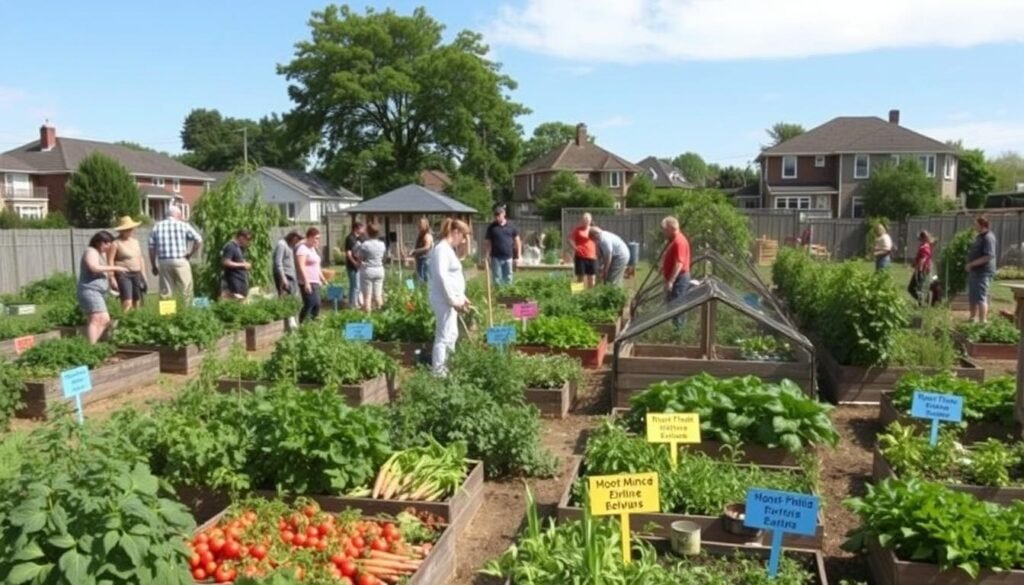
- Types and sizes of plants you can have
- How far apart and tall they can be
- How to water and weed properly
- Rules about fences or raised beds
It’s important to look up these bylaws to garden right. Following the local gardening laws makes community gardens work well.
| City | Aesthetic Guidelines | Maintenance Requirements | Permissible Planting Zones |
|---|---|---|---|
| City A | Maintain neat appearance | Weekly weeding and watering | Residential zones only |
| City B | No unkept plots allowed | Mow regularly and prune plants | Commercial zones may apply |
| City C | Colorful flowers encouraged | Monthly inspections | Multi-family residential permitted |
By knowing the bylaws for vegetable gardens, city gardeners can grow beautiful spaces legally.
Urban Homesteading Restrictions
Urban homesteading is a great way for people to connect with where their food comes from. They can turn tiny urban spaces into gardens full of produce. However, this practice faces challenges. Many cities have rules that limit keeping animals due to zoning laws and community regulations. For those dreaming of having chickens or bees, some cities don’t allow these animals.
Water use is another concern. Urban farming laws may restrict how much water a homeowner can use for watering their plants. Growers also have rules about how big and where they can have their gardens. These rules are there to keep neighborhoods looking nice and to keep up property values. But, they can make it hard for people trying to grow their own food.
Knowing about these rules helps future homesteaders overcome obstacles to growing their own food. Understanding what’s allowed can lead to responsible gardening while still aiming for independence. As cities focus more on green living, urban gardeners must understand these laws to succeed.
- Research local ordinances regarding livestock.
- Check water usage policies for gardening.
- Understand space limitations for garden plots.
Understanding Backyard Farming Regulations
Backyard farming rules differ a lot in the U.S. They affect how people use their land for growing food. Many people don’t know the laws about gardening at home. These laws say what plants you can grow, how to grow them, and if farm-related structures are allowed.
Knowing the rules for backyard farms is important for gardeners. These rules can tell the difference between personal and commercial gardens. For example, you might be allowed to have a vegetable garden. But, there might be rules against selling your vegetables. Learning your local rules can help you avoid legal issues. This ensures your garden meets the standards.
- Follow local zoning laws to find out if you can farm on your land.
- Check the rules about keeping animals and bees, as these differ by area.
- Know the rules on water use and using pesticides in home gardens.
Each city handles backyard farming in its own way. Some cities support it by providing help to follow the rules. Others have strict laws that make it hard for gardeners. Sometimes, people have legal issues because the rules aren’t clear. This often needs local officials to step in and explain the rules.
| Criteria | Home Gardens | Commercial Farms |
|---|---|---|
| Scale of Production | Typically small-scale for personal consumption | Larger scale with potential for profit |
| Permitting | Often require minimal permits | Usually require multiple permits & inspections |
| Sale of Produce | Restricted or prohibited in many areas | Allowed with proper licensing |
| Types of Plants | Generally unrestricted | May face restrictions based on local regulations |
By following these regulations well, you can enjoy gardening without legal trouble. Being ahead in understanding these laws helps make gardening a success. It’s all about staying compliant and enjoying your garden.
Ordinances Against Growing Edibles
In many urban areas, rules against growing food make gardening tough. Local governments set strict laws about fruits, vegetables, and herbs. This is because of worries about how things look, pests, and house prices. People often deal with confusing laws that change by location.
These prohibitive gardening laws can restrict plant types and gardening ways. For instance, some places ban vertical gardens or raised beds. These are great for tight spaces. Such limits challenge urban farming, especially where fresh food is scarce. Knowing these rules is key for those who want to grow their food and strengthen community ties.
Getting involved with local leaders can help overcome these issues. People should push for changes to existing food-growing bans. Working together, community members and officials can introduce better gardening rules.
| City | Ordinance Type | Restrictions |
|---|---|---|
| City A | Edibles Limit | No more than 3 types of edible plants |
| City B | Vertical Gardening Ban | Prohibition on vertical structures |
| City C | Raised Bed Restrictions | Height limit of 12 inches for raised beds |
| City D | Fencing Requirements | Specific fencing criteria for edible gardens |
Knowing the local laws on urban farming helps gardeners succeed. Advocating for changes not only improves gardening chances but also helps the community. It boosts health and independence.
Legal Guidelines for Home Food Production
For those interested in home food production, knowing the law is key. The rules can change, depending on where you live. Some laws are set by the state, others by the nation. It’s important to know both to avoid trouble.
State vs. Federal Regulations
State laws have a big say in home food growing. But, there are also federal rules to follow. Every state has its own extra rules. Sometimes, state rules are tougher than the federal ones. So, it’s crucial to understand both to be safe and legal. For example, what you can grow, and where you can grow it, might be limited.
- State Regulations: These laws differ by state and cover things like zoning and what food you can produce.
- Federal Regulations: These are the big rules for everyone, focusing on how to keep food safe.
- Local Ordinances: Your city or town might have more rules you need to follow.
Researching state and federal rules is a smart move for gardeners. It helps keep your garden legal and successful. Taking this two-pronged approach helps protect your garden adventure from legal issues.
| Aspect | State Agriculture Laws | Federal Gardening Regulations |
|---|---|---|
| Scope | More localized; varies widely by state | Uniform across the country |
| Compliance Authority | State agricultural departments | U.S. Department of Agriculture (USDA) |
| Common Restrictions | Zoning laws, crop types, and permits | Safety standards and food handling practices |
| Potential Consequences | Fines, cease and desist orders | Federal penalties for safety violations |
Impact of Local Community Attitudes on Gardening Laws
Local community attitudes have a big impact on gardening laws. When communities value home food growing, it leads to supportive laws. If people see home food growing positively, local governments will think over their rules. People speaking up is key to changing these laws. In many places, actions by the community have changed laws to help city gardening.
For example, cities with active community gardens often make new laws that help gardening. When residents talk to local leaders, it helps. It shows them the value of growing food at home. This includes better local food access, saving money, and helping the environment.
To show how big the impact is, look at the table below. It compares different communities and their responses to gardening attitudes:
| Community | Local Attitude | Changes Implemented |
|---|---|---|
| Greenwood | Supportive | More backyard garden permits |
| Lakeside | Mixed | New community garden spaces |
| Sunnyvale | Growing Support | Fewer rules on city farming |
Community gardens make a big difference, as seen in success stories nationwide. These stories motivate other areas and stress the role of local action in gardening views. Importantly, when more people garden, their joint effort can help change laws for the better.
Challenges and Solutions for Aspiring Urban Farmers
Aspiring urban farmers face many challenges in starting their own food production. They deal with legal issues that change from place to place. They also struggle with having not enough space and finding the right resources like soil, seeds, and tools. Challenges for urban farmers seem tough, but they can be beaten.
To beat these challenges, finding urban farming solutions is key. Joining local gardening clubs or online forums helps a lot. These places offer advice and resources that are very helpful. Also, working together with neighbors to create shared gardens makes the most of the little land available. This also builds a strong community feeling among urban farmers. Sharing resources and knowledge boosts the chances of success for gardeners.
In summary, urban farming comes with its hurdles, but it’s definitely doable and worthwhile. Looking for support and trying out new gardening methods helps get through the tough parts. Support for home gardens leads to personal joy. It also makes communities healthier and cities more sustainable.
